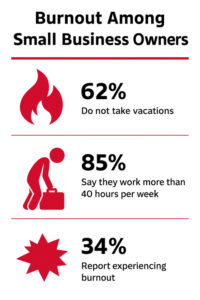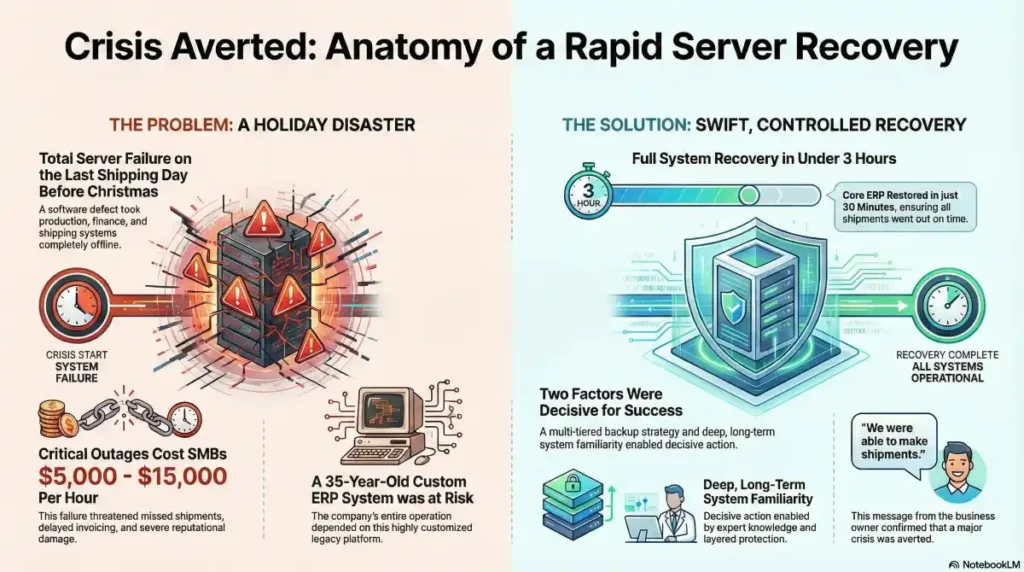Introduction: The Reluctance to Step Away
Running a small business often feels like a seven-day sprint with no finish line in sight. For many entrepreneurs, the very idea of taking time off triggers a quiet panic—who will answer client emails, handle orders, fix the website if it crashes? It’s tempting to believe that hustle is the lifeblood of a growing enterprise.
quiet panic—who will answer client emails, handle orders, fix the website if it crashes? It’s tempting to believe that hustle is the lifeblood of a growing enterprise.
But here’s the inconvenient truth: refusing to take a break may actually be costing your business more than you realize. Time off isn’t an indulgence. When done right, it’s a strategic reset that strengthens leadership, improves clarity, and protects your company’s long-term sustainability.
Let’s make the business case for something many entrepreneurs neglect—taking a proper vacation.
1. Burnout Is Bad for Business
Burnout doesn’t just affect your mood—it affects your judgment, your patience, and eventually, your customers. Entrepreneurs often normalize stress, mistaking it for drive. But the signs of burnout are easy to spot: short temper, mental fog, procrastination, late-night doom scrolling, disengagement from key tasks.
More dangerously, burnout leads to reactive decision-making. You start putting out fires instead of building systems. You accept bad clients to fill gaps. You make expensive mistakes because you’re too tired to think clearly.
According to a 2023 survey by the National Federation of Independent Business (NFIB), over 62% of small business owners reported experiencing extreme stress or burnout in the past 12 months—and that’s likely underreported. That level of chronic fatigue can degrade your performance faster than you might expect.
Vacations aren’t the only cure, but they are a proven pressure release valve. Even a brief reset—72 hours off-grid—can improve focus, reduce cortisol, and bring back a level of emotional steadiness your business needs from its leader.
2. Distance Drives Clarity
One of the most underrated benefits of stepping away from your business is the mental altitude it gives you. When you’re buried in day-to-day tasks, it’s difficult to see where your business is heading. But when you unplug, your brain starts making connections it can’t make under stress.
Ever notice how your best ideas come in the shower or while driving? That’s not a fluke. Mental downtime activates what neuroscientists call the “default mode network,” which allows your brain to wander and solve problems subconsciously.
Vacations accelerate this process.
Some business owners come back from vacation with a breakthrough idea, a new pricing model, or the realization that half their energy is going into low-ROI work. That kind of clarity doesn’t arrive when you’re bouncing between Slack notifications and phone calls.
If nothing else, taking a break forces you to ask: Is my business able to run without me for a few days? If not, why?
3. Your Team (or Your Tools) Can Step Up
Many owners hesitate to leave because they believe the business can’t function without them. That’s a red flag, not a compliment.
If you’ve built a company that collapses the moment you’re unreachable, it’s time to rethink your systems. Vacations act as stress tests. They expose weak points, force process improvements, and—if you have a team—create space for others to grow.
Delegation isn’t just a management tactic; it’s a growth strategy. Trusting someone else to handle the phones, manage the schedule, or run the storefront while you’re away empowers them to take ownership. It might feel risky, but it’s the only way to scale.
Even if you’re a solo operator, today’s tech can cover for you:
Auto-responders handle customer emails
Scheduling tools automate appointments
Remote monitoring can alert you to website issues
Managed IT or virtual assistants can cover urgent needs
And with the right prep, you can forward critical calls without babysitting every detail
Time off becomes easier—and safer—with good tech and better trust.
4. Vacations Improve Long-Term Productivity
Research consistently shows that well-rested individuals outperform their exhausted counterparts, especially when it comes to strategic thinking and creative problem-solving.
In a landmark Harvard Business Review study, companies that encouraged managers to take breaks saw higher employee morale, fewer mistakes, and longer retention. The same applies to the owner.
Consider this: would you rather operate at 70% capacity 365 days a year, or 95% capacity 300 days a year?
Fatigue slowly erodes quality. Ideas that once seemed exciting start to feel like burdens. You lose the spark that made you start this journey in the first place.
A proper vacation—defined here as at least 3 consecutive days without checking work emails—can restore focus, spark new energy, and lead to better decision-making. You return to your business not just with energy, but with a fresh perspective.
5. Planning Time Off Is Just Good Business Hygiene
Think of vacation planning the same way you would disaster planning, inventory audits, or tax prep—it’s part of keeping your business healthy.
A good vacation plan isn’t about vanishing. It’s about documenting your workflows, preparing your team or tools, and communicating with clients in advance.
Practical steps include:
Setting up auto-responders with specific return dates
Creating a backup point-of-contact for emergencies
Drafting “If I’m Away” cheat sheets for employees or VAs
Scheduling social media or blog content to publish while you’re gone
Using project management platforms (like Trello or Asana) to track active work
Making sure your website, backups, and customer portals are monitored by IT support
All of this contributes to a stronger business—not just for your vacation, but permanently.
6. Vacations Set the Tone for a Healthier Business Culture
As the owner, you set the pace and tone of your business. If you’re always “on,” your team—if you have one—feels guilty stepping away. If you respond to emails on Sundays, clients will expect it.
By intentionally stepping back, you model sustainability. You show that boundaries are respected and that the business is designed for long-term growth, not short-term burnout.
Even if you’re a solo entrepreneur, setting boundaries benefits your clients. A rested, focused professional delivers higher-quality service and communicates more clearly than one constantly teetering on exhaustion.
Want to attract better customers? Start by treating your time like it’s valuable.
Final Word: Time Off Is Leadership, Not Laziness
There’s a quiet pride among small business owners who never take a vacation—as if constant availability is proof of commitment. But real leadership isn’t about martyrdom. It’s about building a business that works whether you’re behind the wheel or taking a well-earned detour.
Time away doesn’t mean losing control. It means you’ve earned the right to breathe.
If you’re overdue for a reset, consider this your permission slip. Whether it’s a three-day staycation or a week in the mountains, your business will thank you for it.




 quiet panic—who will answer client emails, handle orders, fix the website if it crashes? It’s tempting to believe that hustle is the lifeblood of a growing enterprise.
quiet panic—who will answer client emails, handle orders, fix the website if it crashes? It’s tempting to believe that hustle is the lifeblood of a growing enterprise.